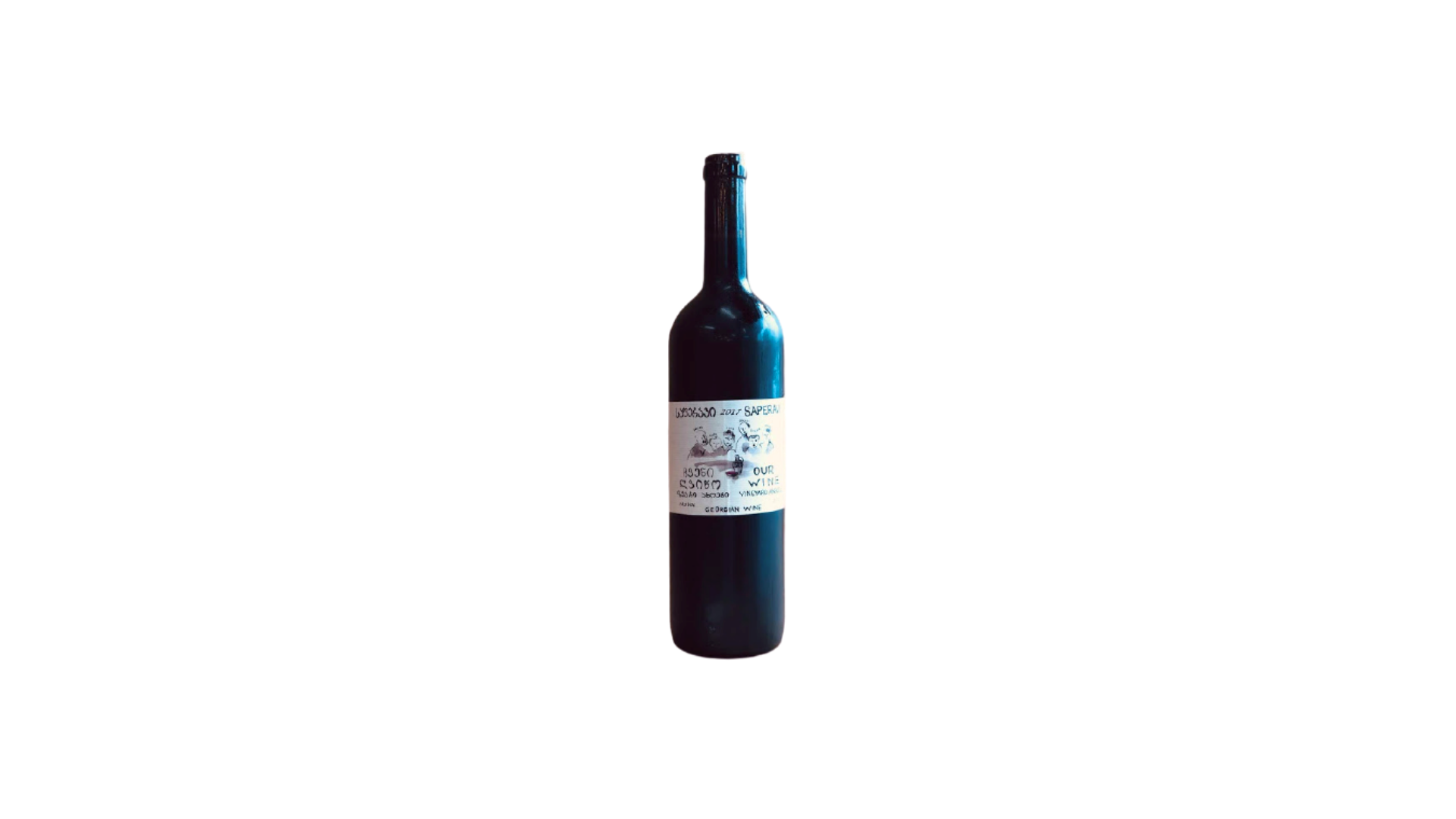Our WineSummary: 数カ国にワインを輸出している小さな生産者であるOur WineのワインメーカーSoliko Tsaishviliは、qvevriで作られた自然派ワインを製造しています。ブドウは自分自身を表現しています。ブドウ畑ではビオディナミの原則が守られ、ワイナリーでは自然派ワインの実践が守られています。
Our Wineのオーナー兼ワインメーカーであるソリコ・ツァイシュヴィリ氏は、30年前からワインを造り続けています。その間、彼はqvevriで多くのブドウ畑とワイン造りの経験を蓄積してきました。彼のワイン造りの旅は30年前、ソリコと数人の友人がブドウを買ってワイン造りを始めたことから始まりました。彼のフルタイムの仕事は、アート雑誌の翻訳者と広報担当で、ソリコは自分のブドウ畑で時間を過ごすことができました。ブドウ畑に夢中になった彼は、出版社でのキャリアを捨て、フルタイムでブドウを育て、ワインを作り始めました。
私たちのワインソリコは、自然派ワインを造ることに誇りを持っています。彼は自分の畑ではビオディナミの原則の一部を守り、ワイナリーでは自然の原則を守っています。あなたが彼のワインを味わうとき、あなたはブドウの持つ最大限の表現を味わっているのです。5.5ヘクタールの畑は、主にRkatsiteli、Mtsvane、Saperavi、Khikhviで構成されています。樹齢50年のものもある。
2006年、彼はイタリアのワインバイヤーの訪問を受け、ソリコのワインを非常に気に入ってくれたので、イタリアで流通させるためにワインの一部を購入することにしました。この輸出は、グルジアの自然派ワインメーカーをヨーロッパに紹介するきっかけとなりました。現在、当社のワインはイタリア、フランス、イギリス、アメリカに輸出されています。
私たちのワイン醸造
ソリコは白ブドウの皮を剥く。彼は白ブドウとジュースをqvevriに加え、茎の一部をqvevriに加えます。白ワインは毎日数回発酵させ、パンチダウンさせます。発酵後、白ワインは半年間チャチャ(ポマース)の上に置いておきます。
私たちのワインレッドのブドウも除梗され、果汁とチャチャチャがqvevriに加えられます。ソリコでは茎は入れません。発酵には通常3週間かかります。発酵後、ソリコはワインだけを別のqvevriに移して熟成させます。ソリコは実験が好きです。彼は赤ワインを半年間チャチャの上に置いて熟成させたものを持っている。
私たちが訪問している間、テレビのクルーが撮影をしていました。ソリコさんがキャップの開け方を実演してくれました。私はqvevevriの中のRkatsiteliのキャップをパンチダウンするように頼まれました。この日は発酵10日目でしたが、キャップは簡単にパンチダウンできました。その後、オーストリアからのインターンのトーマスが、qvevriの上部近くの内壁を拭いてくれた。これは、パンチダウンの際に飛び散った可能性のあるジュースやチャチャチャの一部を取り除くためでした。汚れたままにしておくと、バクテリアが繁殖する可能性のある場所になってしまう。この作業には注意が必要です。あなたは、発酵が炭酸ガスを放出しているqvevriの上に身を乗り出す。
私たちのワイン
ソリコは輸出できるほどのワインを作っているホームワインメーカーです。テイスティングルームはありません。ブドウ畑に近い木陰の下のピクニックテーブルで試飲しました。とてもリラックスしたテイスティングでした。ソリコにはオーストリアのトーマスさんとウクライナのオルガさんという2人のインターンがいて、翻訳を手伝ってくれました。彼らはワイン造りの技術やブドウ畑での実践について学んでいます。
最初のワインは2006年のRkatsiteli。オレンジがかった琥珀色。フローラルとドライフルーツの香りがアロマと味に感じられました。噛み応えのあるタンニンとドライフルーツの香りが後味に感じられました。Rkatsiteli、Mtsvane、Khikhviの2011年ブレンドを試飲した。ワインは濃い琥珀色。ドライフルーツ、特にゴールデンレーズンのような味がしました。大胆なタンニンと果実味があり、後味にもしっかりとした味わいがある。2011年のサペラヴィは、濃い紫色から黒色のワインだった。アロマは土っぽく、花のような香りがした。ブラックベリーとカシスの風味が感じられる。大胆で噛み応えのあるタンニンがあり、フルーティーな味わい。
テイスティングルームのある大規模生産ワイナリーを探す方が簡単かもしれない。しかし、ワイン愛好家は、優れた自然派ワインを少量生産しているホーム・ワインメーカーを探すべきである。
Our Wine
by
Terry Sullivan
Summary: A small producer who exports wine to several countries, Our Wine winemaker Soliko Tsaishvili crafts natural wines made in qvevri. The grapes express themselves. Biodynamic principles are followed in the vineyard and natural wine practices are adhered to in the winery.
Soliko Tsaishvili, owner and winemaker at Our Wine, has been making wine for three decades. During that time he has accumulated much vineyard experience and winemaking in qvevri. His wine journey into making wine began thirty years ago when Soliko and a few of his friends bought grapes and started making wine. His full time job as a translator and publicist of an art magazine enabled Soliko to spend time in his vineyard. He became crazy about the vineyards and gave up his publishing career to grow grapes and make wine full time.
 Soliko is proud of making natural wine. He follows some of the biodynamic principles in his vineyard and follows natural principles in his winery. When you taste his wines, you are tasting the fullest expression of the grape. The 5.5 hectares of vineyards consists mainly of Rkatsiteli, Mtsvane, Saperavi and Khikhvi. Some of the vines are 50 years old.
Soliko is proud of making natural wine. He follows some of the biodynamic principles in his vineyard and follows natural principles in his winery. When you taste his wines, you are tasting the fullest expression of the grape. The 5.5 hectares of vineyards consists mainly of Rkatsiteli, Mtsvane, Saperavi and Khikhvi. Some of the vines are 50 years old.
In 2006 he was visited by an Italian wine buyer who liked Soliko’s wine so much he decided to buy some of the wine to distribute it in Italy. This export helped to be an introduction of Georgian natural winemakers to Europe. Currently, Our Wine exports to Italy, France, England and the United States.
Winemaking
Soliko destems his white grapes. He adds the white grapes and juice to a qvevri, and then adds some of the stems to the qvevri. The white juice is fermented and punched down several times daily. After fermentation, he leaves the white wine on its chacha (pomace) for six months.
 Red grapes are also destemmed and the juice and chacha added to a qvevri. Soliko does not add the stems though. Fermentation usually takes three weeks. After fermentation, Soliko racks just the wine to another qvevri for aging. Soliko does like to experiment. He has a qvevri of red wine in which he left the wine on its chacha for six months.
Red grapes are also destemmed and the juice and chacha added to a qvevri. Soliko does not add the stems though. Fermentation usually takes three weeks. After fermentation, Soliko racks just the wine to another qvevri for aging. Soliko does like to experiment. He has a qvevri of red wine in which he left the wine on its chacha for six months.
During our visit, a television crew was filming. Soliko demonstrated how to punch down the cap. I was asked to punch down the Rkatsiteli cap in the qvevri. This was the tenth day of fermentation and the cap was easy to punch down. Later, Thomas, an intern from Austria, wiped the inside walls of the qvevri near the top. He did this to remove juice and parts of chacha that may have splattered during punch down. If left uncleaned, they would become a potential area for bacteria growth to begin. The task does require one to be careful. You lean over the qvevri where fermentation has released carbon dioxide gas.
Wines
Soliko is a home winemaker who makes enough wine to export. There is no tasting room. We tasted wines at a picnic table under shade trees close to a vineyard. It was a very relaxed tasting. Soliko had two interns, Thomas from Austria and Olga from the Ukraine helped with the translation. They are learning about winemaking techniques and vineyard practices.
Our first wine was a 2006 Rkatsiteli. It was an amber color with an orange hue. Floral and dried fruit notes were on the aroma and taste. The wine had chewy tannins and dried fruit on the aftertaste. We tasted a 2011 blend of Rkatsiteli, Mtsvane and Khikhvi. The wine was a dark amber color. The wine tasted like dried fruits especially golden raisins. The wine had bold tannins and fruit on the finish. The 2011 Saperavi was a dark purple to black color wine. The aroma was earthy and floral. Blackberries and cassis were noted on the taste. The wine had bold, chewy tannins and was fruity.
It may be easier to locate a large production winery that has a tasting room. However, wine enthusiasts should seek out home winemakers who are producing small quantities of excellent natural wines.
Our Wine



コメント